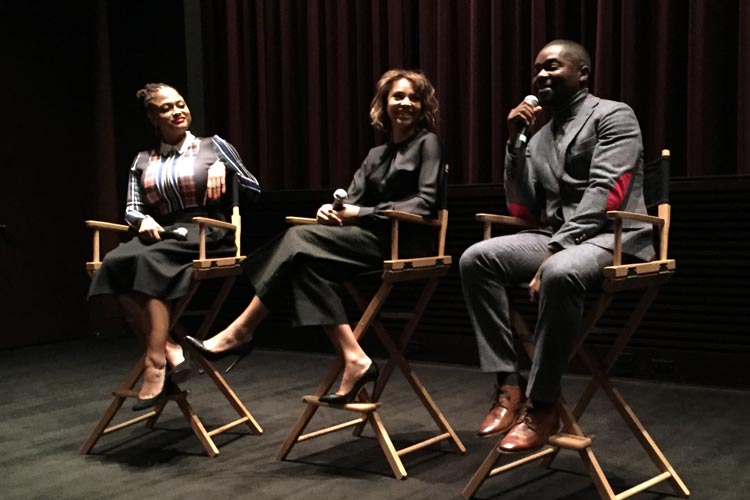The following questions and answers are excerpted from a conversation that followed the NBR screening of Selma.
How did you approach your preparation for portraying Dr. King?
Oyelowo: After I read an early version of the script back in 2007, I just knew this film and playing this man was going to be a part of my future. So my preparation started then – I started stubbornly preparing for a gig that no one wanted me for! I would watch everything, read anything, and talk to anyone who would talk to me. But to be honest, the real revelation of how to get under his skin occurred when I found rare piece of footage online. In it, Dr. King sat in a hallway, and a light got shone upon him, and a camera was unexpectedly thrust in his face. There’s a brief moment you can see between him being unprepared and then turning himself on, so to speak. That was it. That was the man I had to go and find.
“I knew playing this man was going to be a part of my future.”
Can you talk about shooting the scene in the kitchen where they address his infidelity?
DuVernay: The creation of that scene during the re-writes had to do with the insistence that his infidelity be in there somewhere. It was about saying, “This marriage is important” and how to do that without beating you over the head with it or picking the low hanging fruit. A couple other scripts tried to deal with it in different ways, like depicting him and his girlfriend. But I only needed to know how it affected their marriage. That’s the context I wanted. I think that’s related to point of view. Maybe it’s me as a woman director, maybe it’s me as a black director, maybe it’s me as a black woman director, but I was very interested in what Coretta was thinking. That all lent itself to the writing of the scene. I remember shooting . . . it was a late late night after a long long day, and it was basically the Carmen show. David was great with his body so rigid and silent, but you (Carmen), we just let you go and you did amazing work with it.
Ejogo: We had wonderful rehearsal process, which gave us the opportunity to really feel it out prior to arriving on set. It was very indie feeling – we didn’t have a lot of time to shoot the scene. We prepared what the space between us would be. For me personally, the great gift of that scene was that it also allowed the work I did with Coretta throughout the rest of the film to have a somewhat different flavor in that this was the moment the vulnerability is finally revealed in this woman. There is an attempt before and after to keep face, to keep the marriage together, to be the supportive wife and not ask a lot of people herself, to be there for the kids. But this is the scene where she’s really given the opportunity to confront Martin and let him know just what she’s up against to make that happen. Oddly, the simplicity of the staging is what allowed the words to really sing. The writing for me makes that scene just so incredible.
Oyelowo: The original script was more focused on LBJ. King was not as prominent a character, and it was Ava who came along and imbued it with this humanity. And the thing that only she could do was to highlight the women in the film, and the movement. Even though it was a civil rights movement, there was sexism and women who were just as brilliant, just as powerful, and just as worthy of leadership were sidelined. So talking about the scene we’re talking about, what I was really keen on was to feel Coretta’s power. This woman introduced Dr. King to the idea of civil rights. He was a preacher – that was the line he was going. She was the one that had lived in the dangerous, racist part of the south. She educated him, and he was vocal about that. But because of sexual politics at the time, the chips fell the way they did. When we were blocking that scene, there was a discussion about whether he should be standing or sitting, and I felt sure I wanted to sit, to be low down sitting, looking up at her, because we often see Dr. King in a pulpit, looking down on a congregation. I think that helped demonstrate the power, intellect, and articulacy of this woman, despite the emotion she put forth in the scene.

